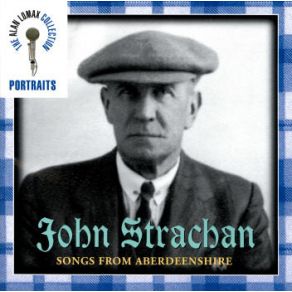The Alan Lomax Collection - Portraits: John Strachan - Songs from Aberdeenshire
Download links and information about The Alan Lomax Collection - Portraits: John Strachan - Songs from Aberdeenshire by John Strachan. This album was released in 2002 and it belongs to World Music, Songwriter/Lyricist, Celtic genres. It contains 24 tracks with total duration of 01:00:32 minutes.

|
|
|---|---|
| Artist: | John Strachan |
| Release date: | 2002 |
| Genre: | World Music, Songwriter/Lyricist, Celtic |
| Tracks: | 24 |
| Duration: | 01:00:32 |
| Buy it NOW at: | |
| Buy on iTunes $9.99 | |
Tracks
[Edit]| No. | Title | Length |
|---|---|---|
| 1. | The Hairst O Rettie | 3:03 |
| 2. | The Miller of Straloch | 1:46 |
| 3. | Glenlogie | 2:18 |
| 4. | The Beggar Man | 2:48 |
| 5. | Rhynie | 1:20 |
| 6. | The Merchant's Son | 2:46 |
| 7. | The Minister's Daughters They Were There | 0:44 |
| 8. | Fin the Bed Began Tae Heat | 1:53 |
| 9. | Binnorie, O Binnorie | 1:46 |
| 10. | The Knight and the Shepherd's Daughter | 2:48 |
| 11. | The Stootest Man in the Forty Twa | 2:34 |
| 12. | Bonny Udny | 1:43 |
| 13. | The Bonny Lass of Fyvie | 2:23 |
| 14. | Clyde's Water | 2:44 |
| 15. | The Laird O Drum | 3:16 |
| 16. | Robin Hood | 0:43 |
| 17. | MacPherson's Rant | 1:25 |
| 18. | Johnnie O Braidislie | 1:41 |
| 19. | The Guise O Tough | 3:03 |
| 20. | The Bogheid Crew | 2:47 |
| 21. | Harrowing Time | 1:48 |
| 22. | Where the Gadie Rins | 1:40 |
| 23. | Lang Johnnie More | 12:49 |
| 24. | I Had Some Far Better Verses Than That (Interview) | 0:44 |
Details
[Edit]Farmer and Scotsman John Strachan sat in front of folklorist Alan Lomax' microphone for song and conversation in 1951, when the balladeer was 76 years young. Known in the Northeast as one of the preeminent interpreters of both children's and "bothy" (farm life) ballads, Strachan's rough brogue cuts through each story, peppered with the phrasing and grit of a man who had sung these songs in the fields and pubs for his entire life. In 2002, Rounder Records' Select label released Songs From Aberdeenshire as part of its Alan Lomax Portrait Series, reissuing some songs that had appeared on previous collections of Scottish ballads, as well as some previously unreleased songs. The liner notes are very complete, with transcriptions of both the songs and the spoken introductions, and the recording is clean and intimate in the traditional Lomax style. These unaccompanied folk songs are best seen as historical recountings of a life since past, so those looking for "20 Greatest Drinking Songs" will be sorely disappointed, but those who seek out real, truthful rural ballads will be overjoyed.